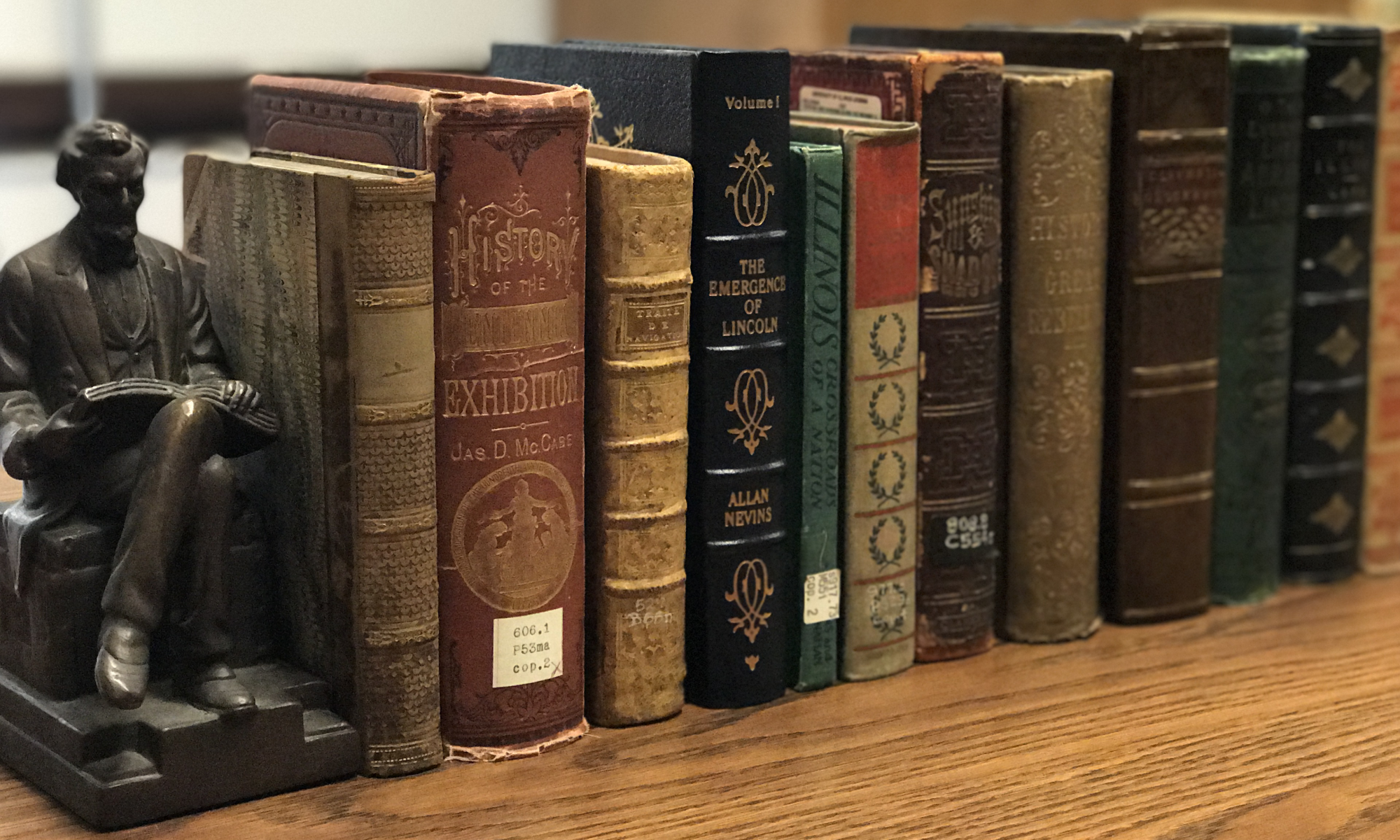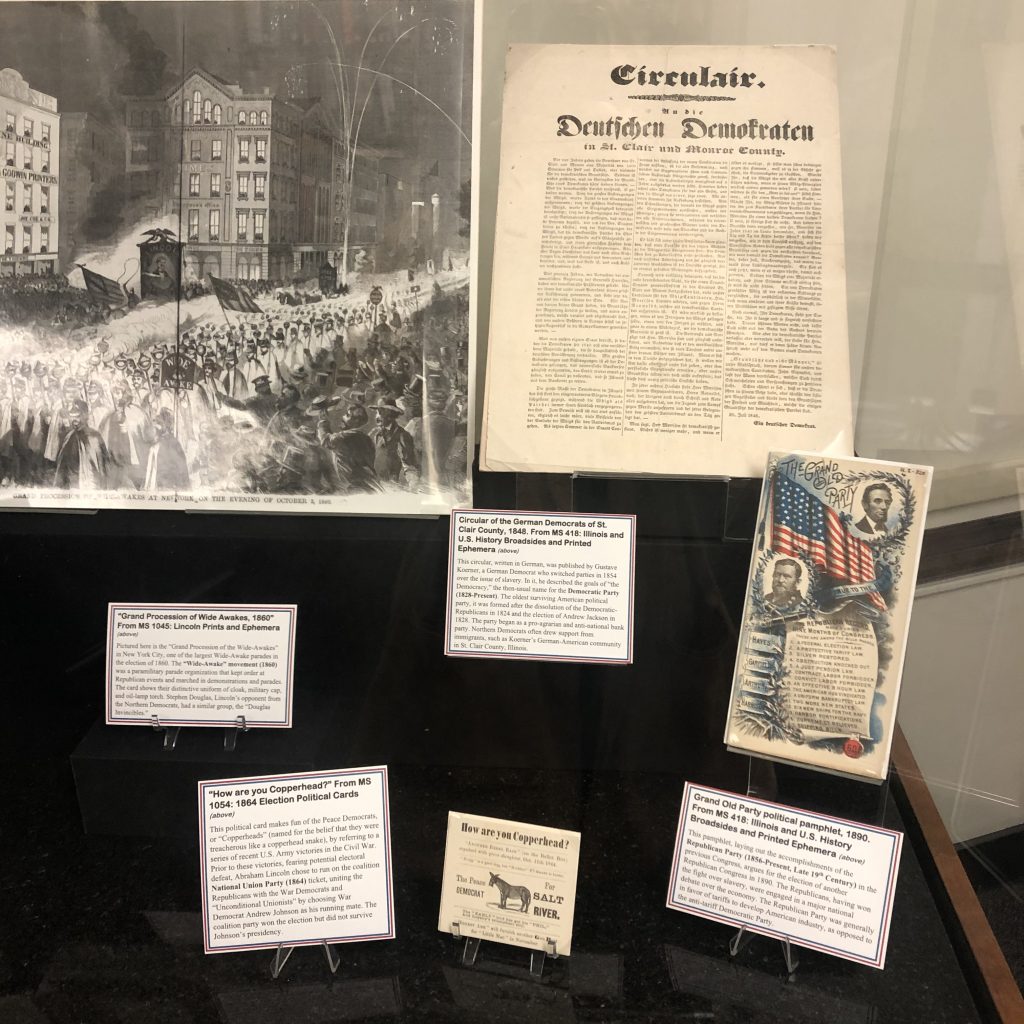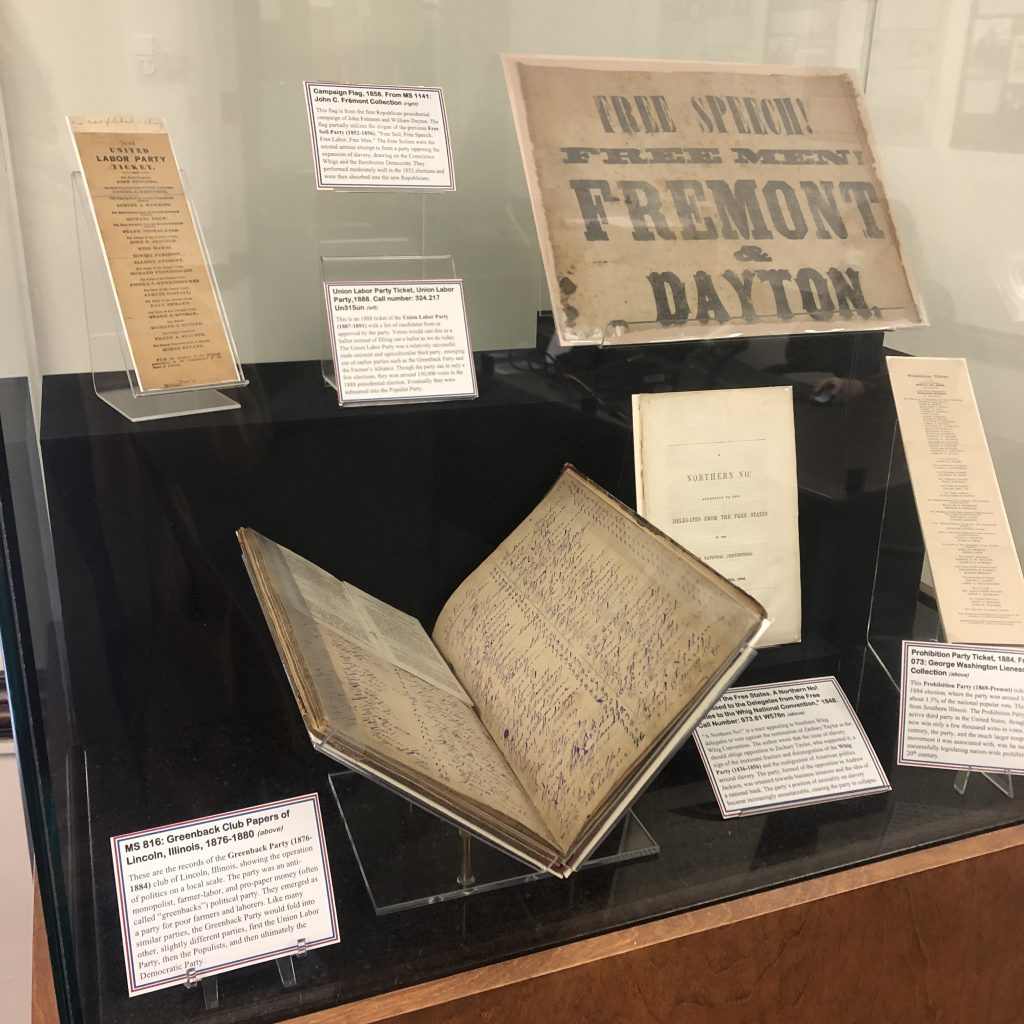The 19th century was a period of substantial party instability in American politics. New parties emerged, vanished, merged, and succeeded, altering the shape of the American political discourse. The Illinois Historical and Lincoln Collections has a special pop-up exhibit on display that highlights some of these political parties. Drawing on several of our archival collections and cataloged material, the exhibit contains pamphlets, election tickets, broadsides and other items produced by the parties of the 19th century, their partisans, and their opponents. The exhibit will be on display for the remainder of the Fall 2022 semester.
The Collapse of the Whigs and the Civil War
From the 1830s to the mid-1850s, the Whig Party was one of two major American political parties. Opposed to the Jacksonian Democratic Party, the Whigs were united on issues such as tariffs and proposals for a national bank, but fundamentally divided on the issue of slavery, which would eventually prove the downfall of the party. By 1848, the issue of “the SLAVE POWER,” the fear that the South would use its political influence to institute slavery wherever possible and permanently dominate the Senate, was beginning to fracture the Whig Party between its northern and southern branches, and between those northerners able to tolerate the existence of slavery and those for whom the expansion of slavery had to be opposed. A pamphlet entitled “A Northern No!” gives voice to the frustrations of one northern Whig, imploring the northern delegates at the 1848 party conference to vote against the nomination of Zachary Taylor for president. Ultimately, Taylor was nominated and won the presidency.
The increasing inability of the Whig Party to address the issue of slavery in favor of unity on other issues caused the party’s collapse before the 1856 presidential election. In the 1852 election, the Free Soil Party ran and performed moderately well, showcasing the growing strength of the anti-slavery cause, though the Free Soil Party was, unlike the preceding Liberty Party, not abolitionist. Instead, their opposition to the expansion of slavery was driven by fear that paid white laborers would be outcompeted by enslaved African-Americans.
The Free Soil party, which drew on anti-slavery Whigs and Democrats, was strong in the North, including support in the Midwest, such as Ohio and Illinois. The John C. Frémont Collection (MS 1141) contains a flag from the 1856 Republican campaign, which draws on the slogan of the Free Soil Party: “Free Soil, Free Speech, Free Labor, Free Men,” and adding the name of the Republican candidate, “Fremont” to “Free Speech, Free Men.” The Free Soil party would generally become a part of the then-new Republican Party. John C. Frémont (1813-1890) was a staunchly anti-slavery Free Soiler Democrat who turned Republican with the formation of the party, and was nationally renowned for his expeditions into California. During the 1864 presidential election, Frémont criticized Lincoln as insufficiently abolitionist and mounted a short-lived challenge as the candidate of the Radical Democratic Party, though he ultimately withdrew from the election.
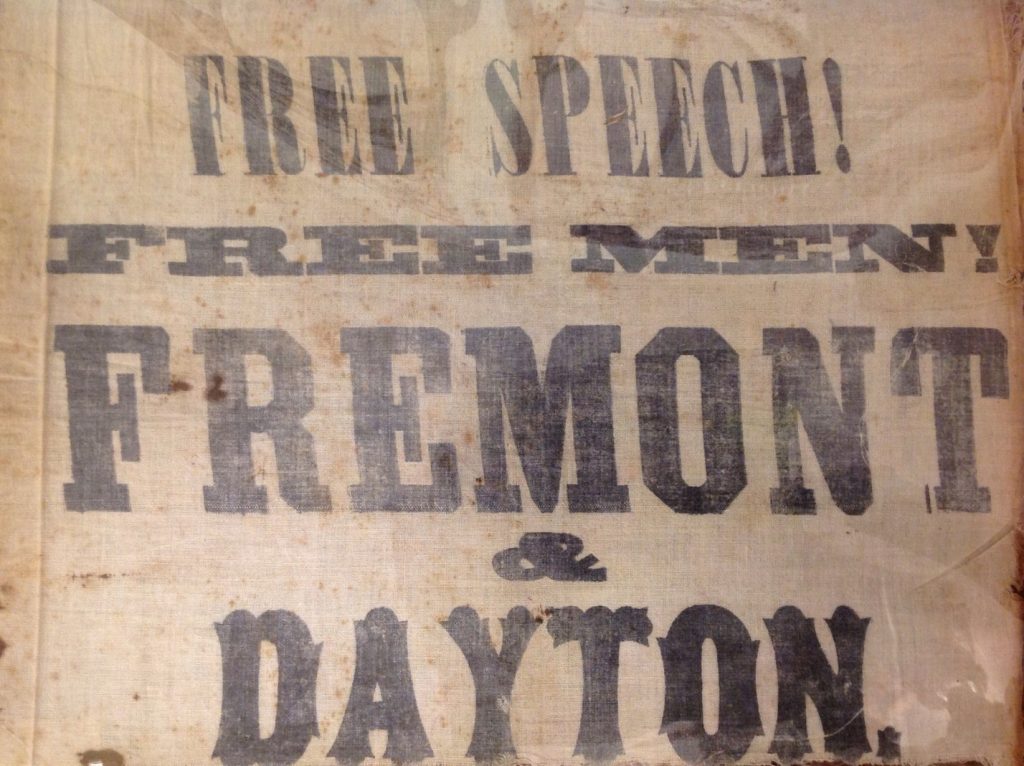
The collapse of the Whigs opened up space for more than just the new Free Soilers. The American Party, better known as the Know-Nothings, also briefly took to national prominence before fading. The Know-Nothings were a staunchly anti-immigrant and, in particular, anti-Catholic, political party. In an 1856 letter from Abraham Lincoln to Jesse Pickrell (MS 1037), Lincoln requested that Pickrell encourage Central Illinois citizens who planned to vote for the Know-Nothings candidate, former President Millard Fillmore, to vote instead for the Republican candidate, Frémont, in order to avoid splitting votes and giving the election to the Democratic candidate, James Buchanan. Lincoln’s efforts failed, and Buchanan won Illinois, securing a few thousand votes more than Frémont. Lincoln’s fears of vote-splitting proved accurate as Fillmore received 37,531 votes.
The Whig Party’s primary rivals, the Democrats, survived this period of transition, though the Democratic Party would also go through changes in the years leading up to the Civil War. In Illinois, support for the Democratic Party was generally higher in the south of the state. “The Democracy,” as the Democratic Party was then generally known, also drew on the support of German immigrants and other groups, as reflected in the letters and pamphlets of Gustav Koerner (MS 044). Koerner was an Illinois State Representative and later Illinois Supreme Court justice. Koerner left the Democratic Party over the issue of slavery, as he was strongly opposed to the Kansas-Nebraska Act of 1854. He joined the Republican Party and brought many members of his German American community with him, though he later rejoined the Democrats over corruption issues in the 1870s.
Koerner would not be the only person to leave or split the Democratic Party before and during the Civil War. In the 1860 election, the Democrats ran two candidates, Stephen Douglas as a Northern Democrat, and John Breckinridge as a Southern Democrat. With the outbreak of war, the Northern Democrats later split between the Peace Democrats, derisively referred to as the Copperheads, and the War Democrats. The War Democrats in part joined with the Republicans in the 1864 election to form the National Union Party, receiving the vice-presidential slot in the form of Andrew Johnson.
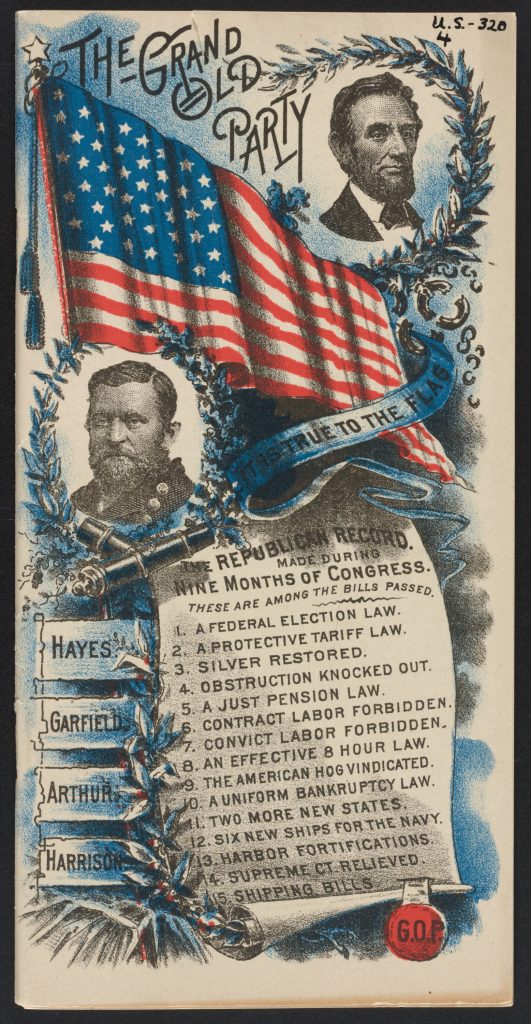
Out of the collapse of the Whigs and the reorientation of some of the Democratic Party came a new political party, the Republican Party, which was founded in the 1850s and grew rapidly in strength. In 1856, the party ran its first national election with presidential candidate, John C. Frémont, a former Free Soiler Democrat. He lost the election to James Buchanan. Four years later, in 1860, the Republican party won the presidential election with Abraham Lincoln for president and Hannibal Hamlin for vice president. The Republicans drew on a variety of different political currents, but especially on the strong antipathy towards the expansion of slavery of the Free Soilers. The party was opposed to the expansion of slavery, but many early Republican elected officials did not publicly support abolition, including Lincoln, who would move towards abolition during the Civil War.
A number of items related to the birth of the new Republican Party are housed in the IHLC collection, including an 1860 Republican ticket, containing all Republican candidates at all levels, beginning with Lincoln and Hamlin. These tickets, handed out by political parties and organizations would be cast by voters as ballots, instead of voters being given a ballot with all possible candidates like they are today. Some voters would choose to handwrite their own tickets, but this was relatively rare by the middle of the 19th century.
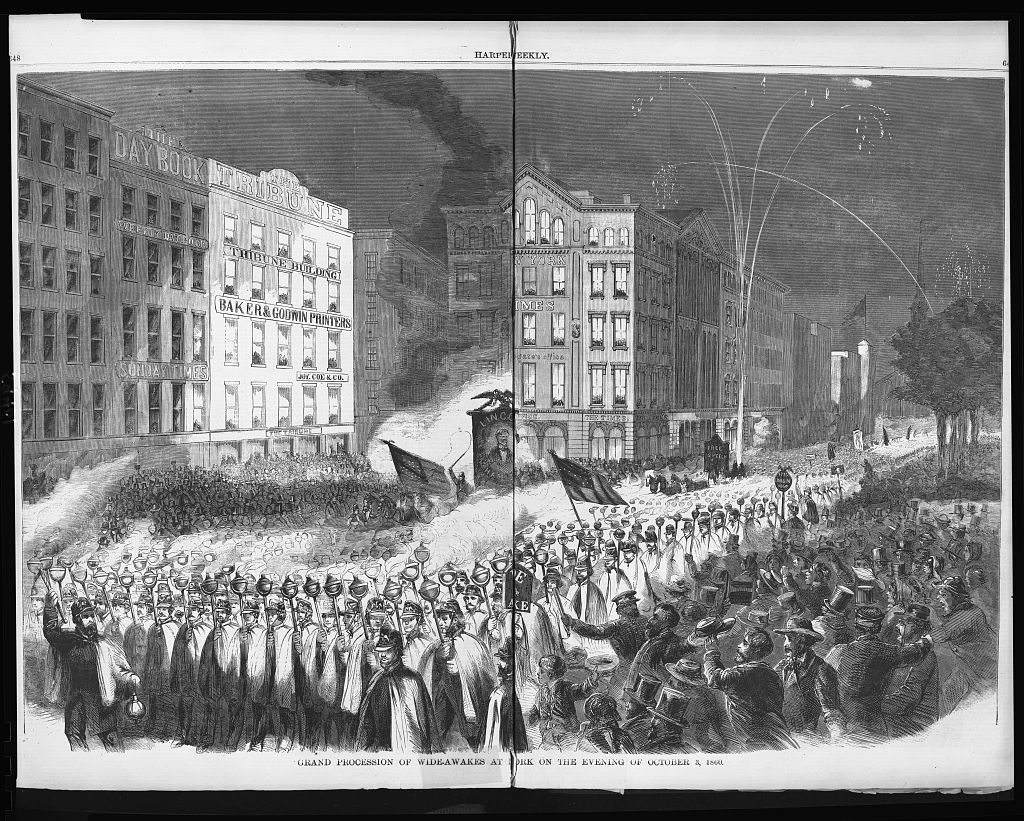
Contained in the Lincoln Prints and Ephemera Collection (MS 1045), is a print of the Republican nominating convention and a print of the “Grand Procession of Wide-Awakes” in New York City, a Republican paramilitary and parade organization. The Wide-Awakes, made up of young men, paraded through American cities, demonstrating Republican political strength, and acting as keepers of the peace at Republican events. Similar organizations were also present in the other political parties of the period, such as the “Douglas Invincibles,” who provided support for Stephen Douglas’s campaign.
The Shifts of the Late 1800s
The Civil War era was not the only period of the 19th century to see many new parties emerge and compete for viability. The late 19th century also saw the emergence of new political movements, but unlike the Republican Party, none of them would emerge as major parties in the American electoral system. Still, they would have substantial influence on American politics and life into the early 20th century.
One of these major movements of the late 19th century was the Populist movement of the West, which drew on poor farmers as their primary base of support. The Populist Party, or People’s Party, emerged out of several smaller parties, including the Greenback Party and the Farmer’s Alliance. The IHLC holds records from the Greenback Club of Lincoln, Illinois (MS 816), which date to somewhere between 1876 and 1880. The Greenback Party demanded an end to the gold standard monetary system, and a return to the fiat money of the Civil War era (greenbacks, which were paper money). The later Populist Party would demand bimetallism, which would allow silver to be used alongside gold. In the 1892 election, the Populists won several small states in the West, and, in 1896, William Jennings Bryan won the Democratic nomination off his “Cross of Gold” speech, which promised bimetallism. While Bryan lost the election, he brought the ideas of the Populist Party into one of the two large American political parties of the period.

A similar process was also playing out with another idea, that of prohibition. The Prohibition Party, founded in 1869 and still extant, was part of the much larger temperance movement, advocating for reductions in alcohol consumption and, for the prohibitionists, the banning of all sales of alcohol. While never garnering much more than 2% of the vote in any election, the temperance movement would succeed in its goals, banning all sale of alcohol in the United States in the 1920s, with members of both the Republican and Democratic parties in support of prohibition. The IHLC holds a Prohibition Party ticket from the 1884 election, which lists all Prohibition Party candidates for local and federal offices and acted as a ballot, castable by a voter. The Prohibition Party won around 150,000 votes in the 1884 election.
Another political ticket held by the IHLC is a Union Labor Party Ticket from Chicago. This party was one of many parties that emerged championing the cause of labor unions in the United States during the Gilded Age, advocating for the rights of workers and the advancement of unions. This Union Labor Party (there were several between 1880 and 1930) emerged out of the Greenback Party and would go on to win around 150,000 votes in the 1888 election, a small but not insignificant number. These early labor parties saw some local success and would ultimately influence or become either the early American socialist parties, or the Progressive movements inside the Republican and Democratic Parties, with the ULP merging into the Populist Party, which itself became part of the Democratic Party.
By the end of the 19th century, the stage was set for many of the key developments in American politics of the first half of the 20th century: the Teddy Roosevelt era of Progressivism, the culmination of the Temperance Movement in Prohibition, and the growing strength of organized labor and unions. Almost all of these had begun with small political parties and special interest movements, but their policies began to affect those of the major parties, and, ultimately, they were often absorbed into them, either wholly or into special factions of the parties, such as the Progressive factions of both the Democrats and the Republicans.
“From Free Soil to Free Silver” will be on display in the IHLC reading room (University of Illinois Urbana-Champaign Main Library Room 324) for the remainder of the semester. IHLC’s reading room hours for the fall semester are Monday-Friday, 9am-12pm and 1-5pm. Please see our website for holidays and updates.
Sources
The New York Times, “Party Lines in the West; a Decrease in Republican Votes in Wisconsin”. 16th July, 1888. Accessed 3rd October 2022. https://www.nytimes.com/1888/07/16/archives/party-lines-in-the-west-decrease-of-republican-votes-in-wisconsin-a.html?searchResultPosition=93
Encyclopedia of Arkansas. s.v. “Greenback Party”, accessed October 3rd 2022, updated Sep 30th, 2022. https://encyclopediaofarkansas.net/entries/greenback-party-598/
Encyclopedia of Arkansas. s.v. “Union Labor Party”, accessed October 3rd 2022, updated Sep 30th, 2022. https://encyclopediaofarkansas.net/entries/union-labor-party-595/
Wills, Matthew. “Abolitionist “Wide Awakes” Were Woke Before “Woke”, in “JSTOR Daily”. Jun 29, 2020. Accessed 3rd October 2022. https://daily.jstor.org/abolitionist-wide-awakes-were-woke-before-woke/
Encyclopedia Britannica Online. s.v “Whig Party”, accessed Oct 3rd, 2022, updated Sep 20th, 2022. https://www.britannica.com/topic/Whig-Party
Encyclopedia Britannica Online. s.v “Prohibition Party”, accessed Oct 3rd, 2022, updated May 6th, 2008. https://www.britannica.com/topic/Prohibition-Party
Encyclopedia Britannica Online. s.v “Prohibition Party”, accessed Oct 4th, 2022, updated July 9th, 2022. https://www.britannica.com/biography/John-C-Fremont
Boissoneault, Lorraine. “How the 19th-Century Know Nothing Party Reshaped American Politics” in Smithsonian Magazine. 26th January 2017. Accessed 3rd October 2022. https://www.smithsonianmag.com/history/immigrants-conspiracies-and-secret-society-launched-american-nativism-180961915/
“Nineteenth Century Political Ballots”. From Boston Athenaeum Digital Collections. Accessed 3rd October 2022. https://cdm.bostonathenaeum.org/digital/collection/p16057coll29/
“Free Soil Party Platform”. From The American Presidency Project. Accessed 3rd October 3, 2022. https://www.presidency.ucsb.edu/documents/free-soil-party-platform-1848
IHLC and Image Sources
MS 1141: Frémont, John C. Collection, circa 1856-1889
MS 816: Greenback Club, No. 131, Lincoln, Ill. Papers, 1876-1880
MS 1045: Lincoln Prints and Ephemera Collection
MS 1054: 1864 Election Political Cards
Republican Ticket [Illinois, 1860] : For President, Abraham Lincoln. Vice President, Hannibal Hamlin. United States: [publisher not identified], 1860. https://i-share-uiu.primo.exlibrisgroup.com/permalink/01CARLI_UIU/17ks9l7/alma99865179012205899
Union Labor Party Ticket. Chicago: [publisher not indicated], n.d. https://i-share-uiu.primo.exlibrisgroup.com/permalink/01CARLI_UIU/17ks9l7/alma99937355212205899
MS 044: Gustave Koerner Collection
MS 418: IHLC Collection of Illinois and U.S. History Broadsides and Printed Ephemera, 1800-2001
Whig of the free states. A Northern No! : Addressed to the Delegates from the Free States to the Whig National Convention at Philadelphia, 1848. United States: s.n., 1848. Print. https://i-share-uiu.primo.exlibrisgroup.com/permalink/01CARLI_UIU/t9ll13/alma99451261012205899
Additional IHLC Resources
MS 1037: Lincoln, Abraham. Letter to Jesse A. Pickrell, 1856
